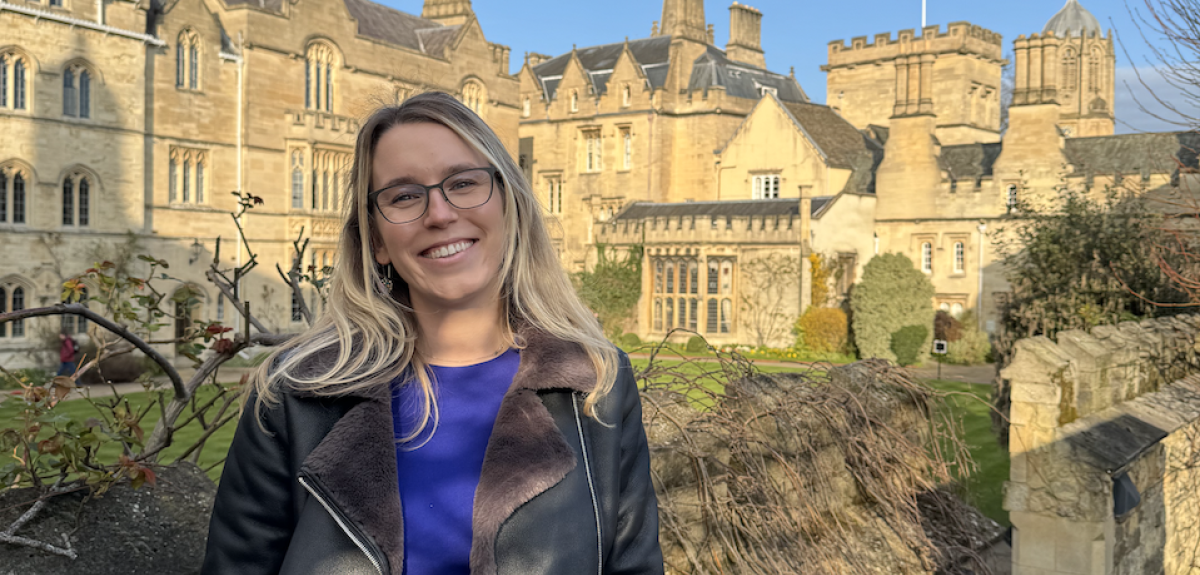
Can AI be a force for inclusion?
Kelsey Doerksen is a DPhil student in Autonomous Intelligent Machines and Systems at the Department of Computer Science, and the President of the Oxford Womxn in Computer Science Society. She is also a Giga Data Science Fellow at UNICEF and a Visiting Researcher at European Space Agency.
There is enormous potential for artificial intelligence (AI) tools to benefit society; from early detection of diseases, to natural disaster response, to helping us write succinct emails. But these technologies need to be viewed under a critical lens to ensure that we are building tools to help, and not harm society.
When we are thinking about reducing bias in AI models, we need to start with the datasets we are using to teach them. AI models are being trained on datasets which we know have systematically left minorities out of the picture; resulting in data that lacks diverse representation of gender identities, sexual orientations, and race, among others. AI can be a powerful tool to mitigate human-induced bias because it is a data-driven approach to decision making, but if the data it is using has biases, this becomes an issue. For example, we have seen generative AI adopting stereotypes and biases when generating images of certain professions that we typically associated with men or women in the past.
In addition to bias mitigation from a data perspective, it is critical that the diversity of users of an AI product are represented at the development stage. Improving gender representation in AI and Computer Science (CS) is something I am very passionate about, and being a part of the Oxford Womxn in Computer Science Society (OxWoCS) for the past three years has been transformative to my experience as a woman in the field.
The success of the society speaks for itself, we have grown to 250+ members with over 750 people on our mailing list, providing academic, career and social opportunities to the CS community at Oxford University across all levels of study and research. My experience leading OxWoCS as the 2023-24 President has been one of the highlights of my DPhil. It has been incredibly rewarding to connect with so many women in the field who are equally as passionate about their research as they are about building a welcoming and safe community for gender minorities in the space.
My hopes for the future of women in the fields of AI and CS is that we continue to champion and advocate for one another to build stronger communities that celebrate the diversity of experiences that we bring to the table.
* 'Artificial intelligence and gender equality: how can we make AI a force for inclusion?' was the topic of a panel discussion co-hosted by the Vice-Chancellor Professor Irene Tracey CBE, FRS, FMedSci and Professor Tim Soutphommasane, Chief Diversity Officer on 6 March 2024 ahead of International Women's Day.
 Africa’s change-makers: meet the Mastercard Foundation Scholars with big ambitions for the future
Africa’s change-makers: meet the Mastercard Foundation Scholars with big ambitions for the future A green fuels breakthrough: bio-engineering bacteria to become ‘hydrogen nanoreactors’
A green fuels breakthrough: bio-engineering bacteria to become ‘hydrogen nanoreactors’ Oxford's student voices at COP29
Oxford's student voices at COP29 Teaching the World’s Future Leaders
Teaching the World’s Future Leaders  A blueprint for sustainability: Building new circular battery economies to power the future
A blueprint for sustainability: Building new circular battery economies to power the future Oxford citizen science project helps improve detection of antibiotic resistance
Oxford citizen science project helps improve detection of antibiotic resistance The Oxford students at the forefront of the fight against microbial resistance
The Oxford students at the forefront of the fight against microbial resistance  The hidden cost of AI: In conversation with Professor Mark Graham
The hidden cost of AI: In conversation with Professor Mark Graham  Astrophoria Foundation Year: Dr Jo Begbie reflects on the programme’s first year
Astrophoria Foundation Year: Dr Jo Begbie reflects on the programme’s first year